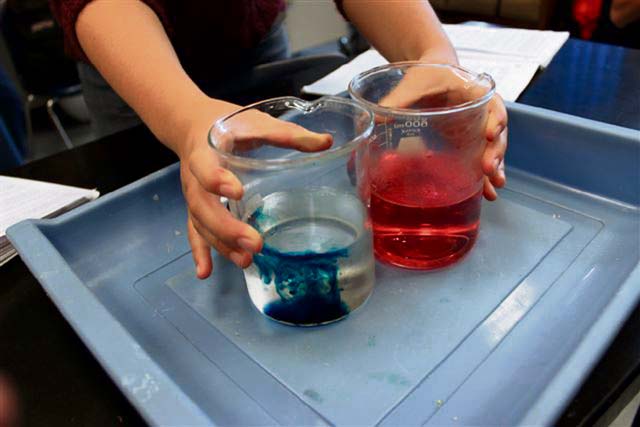
Students do lab work in science class at Ramstein Middle School. The eighth-grade science department recently received a donation from the Ramstein Officers’ Spouses Club to purchase new equipment.
Members of the Ramstein Officers’ Spouses Club made a donation recently to Ramstein Middle School to aid the eighth grade science department.
Donations were used to purchase model seismographs, density scales and cylinders. The new equipment allows teachers to provide hands-on, practical experience in science, technology, engineering and math programs within the school.
“Scales are essential in getting the kids to understand the concept of density,” said Kimberly Coard, Ramstein Middle School eighth grade science teacher. “Density is a hard concept to teach. Density is the basis for at least half the eighth grade course. Before, we had to find random objects and say this one is more dense and this one is less dense.”
The equipment demonstrates density in a completely new way, providing measurable, tangible results instead of relying on visual representations. These tangible results were not limited to measuring density. The new model seismograph brought hard scientific principles to the classroom setting.
The model seismograph acts as a smaller version of a real seismograph and measures the movements of whatever surface it rests on. Students shift the desk under the seismograph to mimic an earthquake.
Teachers often had to demonstrate experiments for the students instead of having the whole class participate prior to the donation.
Going beyond theoretical instruction is vital to the STEM program success here. STEM programs are designed to provide practical experience in subjects encouraging students to pursue technical careers. Allowing students to be more interactive with their lessons stimulates interest in less sought after careers, while providing a sense of involvement in the process.
“It’s important for the students to do labs so they can actually have hands-on practice in the classroom,” said Felicia Raymundo, Ramstein Middle School eighth grade science teacher. “It’s great to teach them theoretically, but to get them to do the actual work takes it to a whole new level.”







